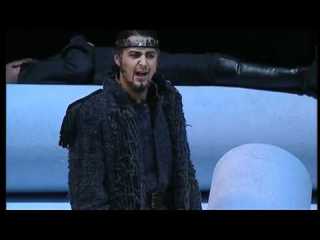Niccolo Jommelli – Demofoonte (Frieder Bernius) [1995]
Niccolo Jommelli – Demofoonte (Frieder Bernius) [1995]

1. Act I 2. Act II 3. Act III Demofoonte : Peter Gronlund Dircea : Petra Hoffmann Timante : Martina Borst Cherinto : Randall K Wong Matusio : Robert Expert Creusa : Helene Schneiderman Adrasto : Max Emanuel Cencic Stuttgart Baroque Ensemble Frieder Bernius: conductor Schwetzingen Festival 22 et 23 mai 1995
Niccolò Jommelli was an innovative opera seria composer with an extraordinary dramatic flair. He altered the contemporary opera seria, involving the orchestra in an ever greater dramatic role, and coming up with innovative ways of arriving at this result. When Jommelli arrived on the scene, Italian opera was dominated by the virtuosic solo singer, and drama was of secondary or even tertiary importance. The public went to hear their favorite singer or composer, and was enthralled by the vocal acrobatics of the virtuosi of the day. Steady streams of groups of secco recitative and exit arias, an aria which was placed at the end of the scene to encourage applause so that the singer could come back on stage, were the building blocks of opera seria, and had little connection with valid dramaturgy. Jommelli and others wanted to change that. Jommelli's compositions tended to use more obbligato recitative, which involved the orchestra as a dramatic partner with the singer. In his later life, he also wrote ensembles and choruses, which had completely gone out of vogue in Italy. His largest ensemble, the final trio in Fetonte, was an entire action scena derived from the action ensembles of comic opera, and included a varied texture of trio, chorus, solos, arioso, and obbligato recitative, as well as programmatic orchestral music. Elements of his style include harmonic and melodic daring, full use of his orchestral resources, mingling of aria and declamation, and a liberal use of chromaticism. His orchestral writing, which included dynamics and the crescendo effect and secondary themes in the dominant, directly influenced the Mannheim symphonists.
Contemporary Neapolitan composers that influenced him include Hasse and Leo, both of whom also altered the form of the opera seria for good. Jommelli's first successes were comic operas, but his serious operas were very successful also. It was from Hasse that he learned to write obbligato recitative instead of the recitative semplice that dominated Italian opera at the time. The dramatic possibilities of the orchestra were attractive to Jommelli, and he began to experiment with his resources.
In 1741 Jommelli set a text by Metastasio, the opera Ezio. It was a singular success, and commissions from Bologna, Venice, Turin, and Padua followed. In 1743, on the recommendation of his colleague Hasse, Jommelli was hired as musical director of the Ospedale degli Incurabili in Venice. For the girls there he wrote oratorios, motets, masses, and choral works. However opera was still his first love.
In 1749 he became maestro coadiutore to the papal chapel, and he composed much sacred music. But he also received commissions for operas from many major cities, for Rome was an international center. One of the most important commissions of his career came at this time, from the city of Vienna. Jommelli set the opera Achille in Sciro for the Viennese court. Metastasio, the king of opera seria librettists, was the court poet in Vienna at the time, and he was so impressed that Jommelli was a court favorite in Vienna for a time. In 1753 Jommelli received an offer to move to Stuttgart, where the Duke was particularly fond of Italian opera and French spectacle. There he was given complete control over his operatic productions, and given almost unlimited resources. He had the best singers and instrumentalists in all of Europe. He developed his obbligato recitative, wrote with great formal variety, and created dramatically complex and alive scenes and acts. Unfortunately, by the time he died, the lighter styles of the opera buffa had taken hold of the public imagination, and his operas were no longer popular. --- Rita Laurance, Rovi
download (mp3 @320 kbs):
uploaded yandex 4shared mega mediafire solidfiles zalivalka cloudmailru oboom








